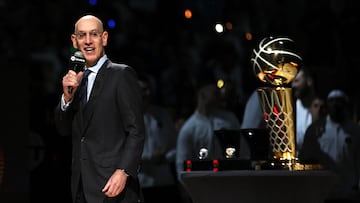Why will the NBA and WNBA media rights be sold together?
Adam Silver explained why he thinks the two basketball entities would benefit if sold their image rights together, at least to some extent.


There has been a lot of talk about the growth of women’s basketball and the awaited professional debut of Caitlin Clark. This has led to speculation that the WNBA could pursue a separate media deal from the NBA.
Currently, the NBA and WNBA are in talks with Disney/ESPN, as the NBA holds an exclusive negotiating window with its two main broadcast partners, the other being Warner Bros. Discovery/Turner. Whether to integrate them will likely be a “collective choice” between the two leagues.
I asked @NBA commissioner Adam Silver about his view on selling the NBA and WNBA media rights together vs. apart.
— Eben Novy-Williams (@novy_williams) April 11, 2024
His answer: They're better together. Here's why 👇https://t.co/9jm2570wRr
Adam Silver, NBA commissioner, spoke about why he believes the two leagues would benefit from being sold together, at least in some capacity. He cited the year-round nature of their combined schedules, the NBA’s expertise in promoting basketball, and the two leagues’ shared investment in technology to improve fan engagement.
Silver believes that it’s in the leagues’ interest to do integrated deals so that “the NBA promotes into the WNBA season and the WNBA promotes into the NBA [season], and we can all talk about basketball.” He also mentioned that both leagues have invested in developing expertise around new technologies, artificial intelligence, and other digital presentations. Combined deals would let both leagues better leverage the benefits of those investments.
Related stories
These talks come amid a broader moment for women’s basketball, with record ratings and ticket demand for this year’s NCAA tournament, NCAA stars moving on to the WNBA, and the pro league experiencing its growth. The 2023 campaign was the WNBA’s most-watched regular season in over 20 years and its highest attendance in 13 years.
The WNBA is paid $60M per year in TV contracts, and that’s its only revenue stream. No televised game has exceeded 1M viewers in 16 years, but the 2023 finals between the New York Liberty and Las Vegas Aces were watched by an average of 728K people, the highest in 20 years. If the NBA and WNBA are sold separately, a network may offer more for the WNBA’s rights if it misses out on the NBA, and that’s where the position of the women’s league has increased in the last few years—the commercial value and quality of their product.

